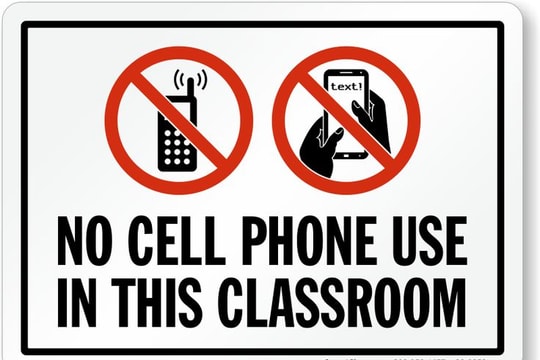Denmark becomes the first country in Europe to ban phones in schools
European countries should follow Denmark's example by banning mobile phones in schools to prevent pupils from being "invaded by digital platforms", the chairman of Denmark's welfare committee has said.
Rasmus Meyer, chairman of a government commission investigating growing discontent among children and young people, said removing mobile phones from school environments gives young people a much-needed "break" from the digital world, helping them learn to engage with real communities and develop their ability to concentrate.
The commission's report, published last month, sounded the alarm about the growing depth of digitalisation in the lives of children and young people.
Among the 35 recommendations made was a proposed law change to completely ban the use of phones in primary and secondary schools, as well as in after-school clubs, a change the Danish government said would be implemented nationwide. The committee also stressed that children under 13 should not own personal smartphones or tablets.

Speaking in an interview with the Guardian, Mr Meyer called on the whole of Europe to adopt a similar ban and suggested that the European Union (EU) issue common regulations for the whole bloc.
“If in five years we find out that phones are actually useful, then we might consider bringing them back,” he said. “But I don’t think that will happen.”
According to him, banning phones in schools not only helps students escape the influence of the virtual world, but also teaches them how to connect socially in the real world, improve attention and respect the school space as an important social institution that should not be invaded by digital platforms.
Meyer said that in schools that have implemented the ban, children are able to concentrate better, interact more with each other and there is a significant reduction in private conversations in the classroom.
Spending time at school without phones is expected to help children practice communication skills and build stronger relationships with friends outside the classroom.
“These changes are happening so fast that society is not adapting,” he added. “This is our effort to stay ahead of the curve and push back against the commercialization of children’s lives through digitalization.”
The commission also pointed out that 94% of young people in Denmark have social media accounts before the age of 13, despite this being the minimum age required by many platforms. Children aged 9 to 14 spend an average of 3 hours a day watching TikTok and YouTube.
Despite the well-documented link between technology use and attention and self-esteem problems in children and adolescents, many children in Denmark and across Europe still bring their phones to school every day.
“We don’t allow kids to bring PlayStations into the classroom,” Rasmus Meyer said, “but that’s exactly what happens when we allow them to bring phones.”
He warned that child safety online is being taken worryingly lightly. “It is shocking that society accepts the fact that so many children are spending 8–10 hours a day on their phones. We are always concerned about children’s safety in the real world, but we have almost abandoned our role as parents and as a society in protecting them online.”
At Skolen på Grundtvigsvej Primary School in Frederiksberg, Copenhagen (Denmark), the ban on cell phone use has been in place since 2018. Principal Helle Bjerg shared: “The rules are very clear, students are not allowed to carry their phones with them during school hours. When entering school, they must hand in their phones and only get them back at the end of the school day.”
The results were clear: children were less distracted, and they talked and interacted more with each other. However, she also admitted that digitizing learning materials meant students still had to use computers, which still posed challenges.
At a nearby after-school club, housed in a large, cozy house, children are allowed to bring phones, but are discouraged from using them. A small but meaningful sign greets them at the door: “You are entering a phone-free zone, give yourself a screen break.” And in a more serious light, the sign warns: “Phones will always be there. Friends will not.”
“Since the phones are gone, the children play more together,” says Hjalte Petersen, a teacher at the school and club, in the kitchen, where the scent of freshly baked bread wafts. “Before, there were no rules about electronic devices, and many children just sat alone, immersed in their own world on their screens.”
Taking away the phones has revived the spirit of bonding between children. Without screens to look at, children are forced to find something else to do to avoid boredom, and that often means playing together.

.jpg)



